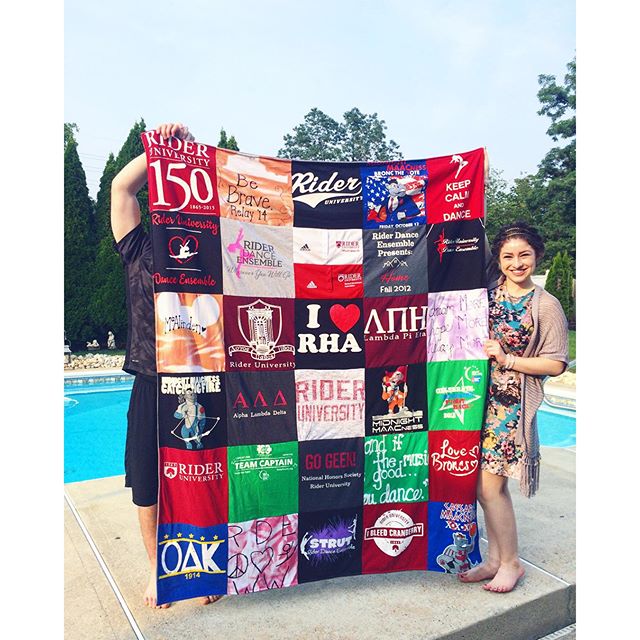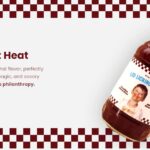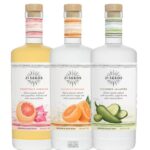Turning T-Shirts into Quilts into a Business
The average American discards 65 pounds of textile each year. Much of that are old t-shirts that no longer fit or have gone out of style. Ross Lohr and his business partner Nathan Rothstein had an idea that they could turn a green idea into some real green money.
The Project Repat story starts in Nairobi, Kenya, where Project Repat co-founder Ross Lohr was doing non-profit education work.
After sitting in traffic for 2 hours, he discovered the cause of the jam: an overturned fruit and vegetable rickshaw pushed by a Kenyan man wearing a t-shirt that said “I Danced My Ass Off at Josh’s Bar Mitzvah”
Amazed by all the incredible t-shirts that get sold off and sent overseas by non-profit and for-profit companies in America, he and his partner began working with Kenyan artisans to design new products out of castaway t-shirts, including bags, scarves, and re-fabricated t-shirts. Those products were “repatriated” (or returned to the country of origin) back to the United States and sold to raise money for non-profits working in East Africa.
When trying to sell their upcycled products at markets in Boston, they quickly discovered the difference between a “good idea” and a real business: while potential customers liked the idea of a repatriated upcycled t-shirt bag, they didn’t like it enough to actually buy it. What customers did ask for, time and time again, was an affordable t-shirt quilt.
They had heard enough: instead of shipping goods all around the country, why not create fair wage jobs in the United States and create a product that has a lot of meaning for customers? As they say, the rest is history. Rather than ‘repatriating’ t-shirts back to the United States, Project Repat creates a high quality, affordable t-shirt quilt with minimal carbon impact that ‘repatriates’ textile job back to the United States.
Follow the Money
The most interesting part of their marketing journey is they had to find a way to finance the growth without investors. They couldn’t sell anyone on funding the idea so they had to grow it organically, one quilt at a time. Venture capital firms and other investors didn’t believe in the idea and feared it would be easily copied by a larger company.
So to get started, Ross and Nathan used Groupon and Living Social to attract new leads through steep discounts. Their belief was that if they could attract enough people, their story would be shared by these brand advocates. So the deep discounting was in part, a way to gain word of mouth. The week they started this program they sold 2,000 quilts. These 2,000 customers helped them acquire new visitors to the website and helped keep their cost per new customer acquisition low.
They also tried a kickstarter campaign but it didn’t help. In their words, these programs help you see if your friends and family love you but it didn’t do much more for their business.
They tried more flash sales and that helped a bit because it did create new customers who in turned, shared their stories on social media.
Retargeting Marketing
One successful technique they continue to use is to give first time visitors a 20% discount just by signing up and giving their email address. Hundreds of new people sign up each day and they use retargeting cookies to follow those mildly interested viewers around the internet. So if you come to their site once, and then you visit other websites, their ads will show up. This is a powerful marketing technique that allows you to set a daily or monthly goal for what you want to spend to reach only those people who have come to your website. It keeps your cost per lead down and is proving to be an effective ongoing marketing strategy for growth.
They started the business in 2012 and today they are on track to do 3.5 million dollars in revenue and are employing American workers in stitch and sew factories. The cost for the quilt vary depending on the size of the bed you are covering. Thousands of quilts later, Americans are recycling their t-shirts into quilts which keeps them out of landfills and preserves those memories.
The t-shirt quilt is backed with PolarTec fleece made out of recycled plastic bottles. Each yard recycles 23 plastic bottles that would otherwise end up in landfills! They call this bottle to blankets.
Funding Your Project
Today, these entrepreneurs are happy to be fully in charge of their own company. They don’t have to answer to the demands of investors and can manage the business at their own pace. This is the same funding approach my wife and I took with our bakery business too so I can appreciate this path.
Sometimes sleeping at night without the pressures of investors can really give you peace of mind. And it helps to have a nice quilt to keep you warm too.
Need help stitching together a marketing plan, click here to talk.




